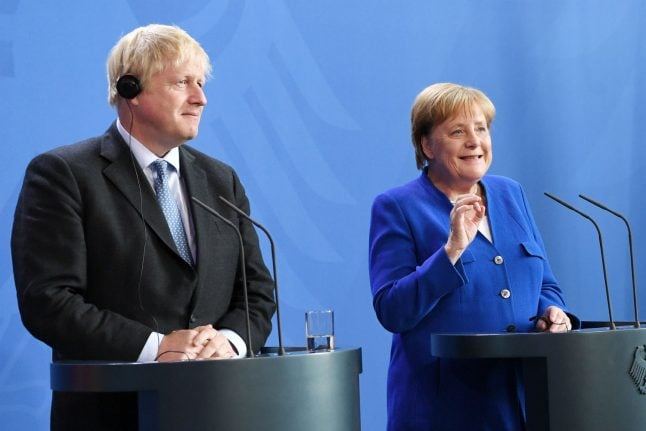In the search for a solution to the Irish “backstop”, Merkel said, “we have said we would probably find it in the next two years, but maybe we can do it in the next 30 days, why not? Then we are one step further in the right direction”.
Yet some commentators said it was too early to reach any conclusions. German historian Helene von Bismark said Merkel had simply struck a “polite” tone, but did not make any concessions.
“Nothing of what Merkel said represents a real change IMO. And there are no illusions about the fact that No Deal remains a real possibility,” tweeted von Bismark.
Remember that the press conference is preceding the actual discussions between Johnson and Merkel. So too early for any conclusions. But nothing of what Merkel said represents a major change IMO. And there are no illusions about the fact that No Deal remains a real possibility.10
— Helene von Bismarck (@HeleneBismarck) August 21, 2019
Britain's eurosceptic press interpreted the exchange positively, with The Daily Mail saying “Boris Johnson received a Brexit boost last night”. “Can we do it? Ja, we can!” read its front page.
But the remarks fit a pattern in which Merkel has often been more conciliatory in public about Brexit than Macron, whose abrasive remarks have sometimes caused anger in London.
“There is not the width of cigarette paper between Paris and Berlin on these issues,” a senior aide to Macron said on Wednesday on condition of anonymity.
The EU official in Brussels added that the EU was “a little concerned based on what we heard yesterday (in Berlin).”
“We are waiting for new facts, workable ideas,” the official added.
The backstop is a mechanism to avoid border checks between EU member Ireland and Northern Ireland, part of the UK. Checkpoints there were removed as part of a 1998 peace deal on the divided island.
But critics have derided the plan because it would temporarily keep Britain in the EU customs union.
In Berlin, Johnson again stressed his view that the backstop “has grave, grave defects for a sovereign, democratic country like the UK” and added that the provision “plainly has to go”.
Merkel said that the mechanism was always meant as a “fallback position” to protect the “integrity of the single market” for the period in which the other 27 EU members and London define their future relationship.
'Blistering timetable'
Johnson told Merkel that he welcomed the “very blistering timetable of 30 days,” adding that “I'm more than happy with that”.
He added: “I just want to be absolutely clear with all our German friends and the German government that we in the UK want a deal, we seek a deal, and I believe we can do that.”
“Wir schaffen das,” he quipped in heavily-accented German, borrowing Merkel's signature German phrase on managing the 2015 refugee influx that translates to “we can do it”.
Johnson, in a “do-or-die” gamble, has insisted Britain will leave the EU on October 31at, no matter whether it has ironed out remaining differences with the bloc or not.
Ahead of his Berlin visit, Johnson reaffirmed in a tweet that “we're going to leave the EU on October 31st and make this country the best in the world to live in”. The message was adorned with a Union Jack flag.
We’re going to leave the EU on October 31st and make this country the best in the world to live in ?? pic.twitter.com/OzLAMo3zDM
— Boris Johnson (@BorisJohnson) August 21, 2019
Meeting Macron
On the second leg of his first foreign visit since taking office, Johnson will meet his French counterpart at the Elysee palace to press home his message that elements of the UK's impending divorce from the European Union must be renegotiated.
But Johnson is likely to face a tougher audience in Paris than in Berlin.
Macron on Wednesday dismissed Johnson's demands that the EU reopen negotiations on the Irish border, saying that the bloc had always been clear it would not agree.
“Renegotiation of the terms currently proposed by the British is not an option that exists, and that has always been made clear by (EU) President Tusk,” Macron told reporters in Paris.
At the weekend, Macron, Merkel and Johnson will meet US President Donald Trump, a vocal supporter of both Brexit and Johnson, and the leaders of Canada, Italy and Japan at a G7 summit in the French seaside resort of Biarritz.



 Please whitelist us to continue reading.
Please whitelist us to continue reading.
Member comments